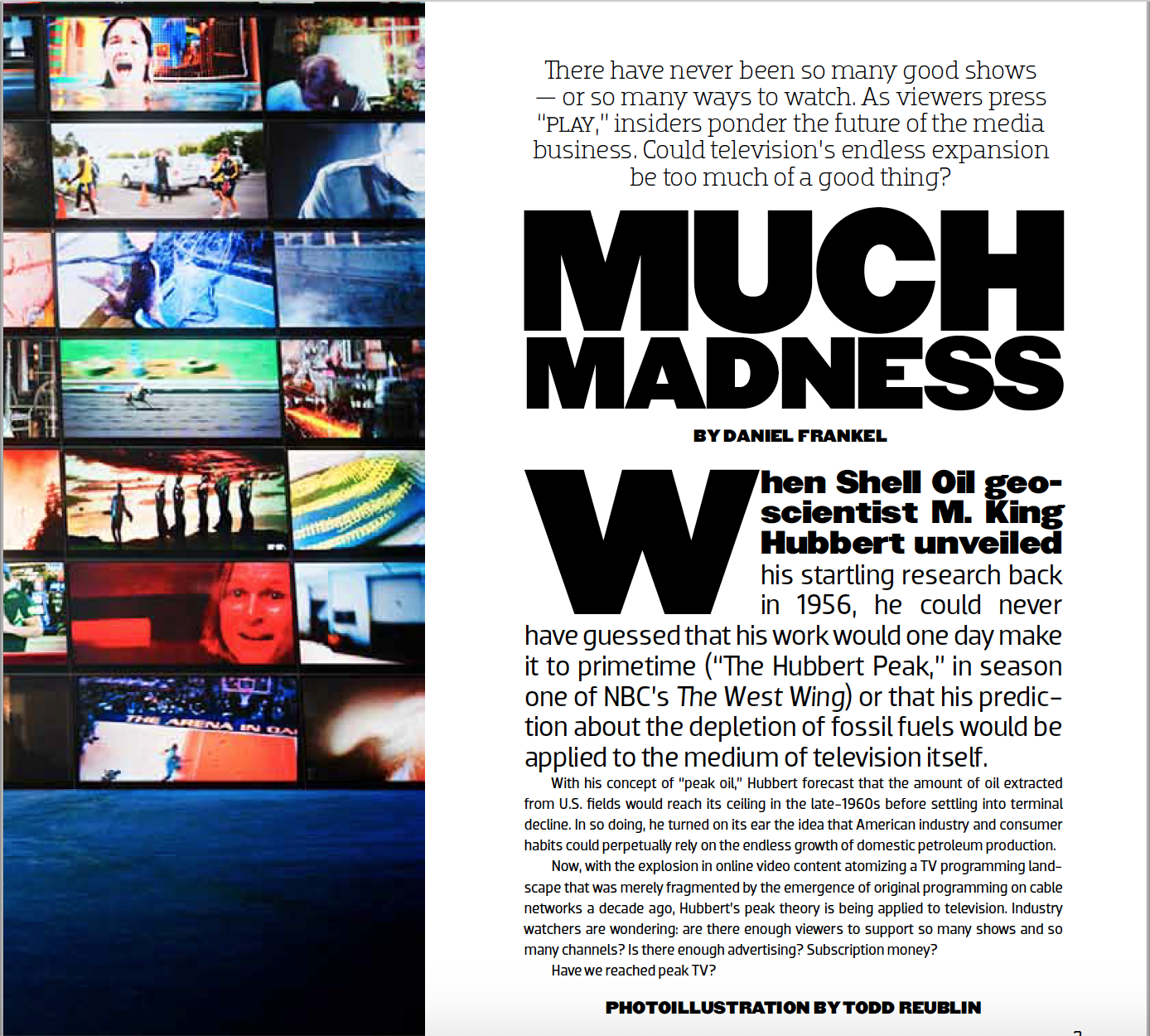Why ‘Peak TV’ Was a Flawed Theory (and John Landgraf Didn’t Invent It)
The unchecked growth of scripted original shows was ultimately undermined by pandemic studio shutdowns, not limits to consumer demand. Oh, and the FX President borrowed the concept of ‘peak TV’ from me

The smarter way to stay on top of the streaming and OTT industry. Sign up below.
You are now subscribed
Your newsletter sign-up was successful
On Friday, FX Networks published a report suggesting the number of scripted original shows on broadcast, basic cable, premium cable and streaming dipped 7% to 493 from their peak of 532 in 2019.
The phenomena of “peak TV,” as it was famously termed by FX’s president John Landgraf five years ago at a Television Critics Association event, finally peaked.
But the theory was flawed—the number of original shows didn’t expand beyond the consumer demand needed to support it. And Landgraf didn’t actually coin the term. I did. Well, sort of.
Also read: Number of Scripted TV Series Dipped 7% in 2020, FX Says
Let me start with the first part. In 2014, as Netflix and Amazon Prime Video first began ramping up their original series slates, FX Networks started publishing what soon grew to be a series of annual research reports, showing the expansion of scripted original shows across the various old and new platforms.
In 2002, the same year FX debuted its first original, gritty bad-cop drama The Shield, there were only 34 original scripted dramas and comedies on broadcast and cable. And there was definitely no SVOD or AVOD.
A decade later, that number of scripted originals had swelled to 125. And Netflix was just about to get started with seminal hits House of Cards and Orange Is the New Black.
The smarter way to stay on top of the streaming and OTT industry. Sign up below.
The number kept expanding from there.
At the summer 2015 TCA Critics Tour in Pasadena, Calif., as the number of scripted shows swelled to 370, Landgraf made his famous declaration, noting, “My sense is that 2015 or 2016 will represent peak TV in America and that we’ll begin to see decline coming the year after that and beyond.”
Of course, Landgraf wasn’t right—led by Netflix, which would annually add billions of dollars to its content budget, the number of TV shows kept right on growing, expanding to the record 532 in the last pre-pandemic year, 2019.
In 2020, viewers worldwide consumed more television than ever amid quarantine, and the number of original shows might have taken its biggest quantum leap yet if not for COVID-impacted circumstance. Big new streaming services including Apple TV Plus, Disney Plus, Quibi, HBO Max and Peacock had commissioned ambitious original series slates for their launch campaigns, But they weren’t able to come through on those plans because COVID locked down their production studios.
So Landgraf’s Peak TV Theory was ultimately proven wrong.
And for what it’s worth, I’m suggesting peak TV might not have been Landgraf’s theory in the first place.
In July 2014, I wrote a feature story for the Academy of TV Arts & Sciences magazine, Emmy, titled “Much Madness.” (This story doesn’t seem to be available on the open, searchable internet—I looked everywhere for it. But here’s a screen grab of the first page in print.)

Having read the term “peak TV” in an article written by Recode’s Peter Kafka—he was using it for a different but related concept, and I also can’t find that story—I led my Emmy piece discussing research conducted in the 1950s by Shell Oil geoscientist M. King Hubbert. In his famous “Hubbert Peak” theory, he predicted the amount of the gooey stuff extracted from U.S. oil fields would reach its peak in the mid-1960s.
Using FX’s research on original shows as a foundation, I postulated that “the explosion in online video content” was “atomizing a TV programming landscape that was merely fragmented by the emergence of original programming on cable networks a decade ago.
“Hubbert’s peak theory is being applied to television,” I wrote. “Industry watchers are wondering, are there enough viewers to support so many shows and so many channels? Is there enough advertising? Subscription money?
“Have we reached peak TV?” I continued.
Of course, we had not. Not even close.
I have not spoken to John Landgraf since writing the article. And to be fair, he never has had the chance to respond to my little sour grapes IP complaint over who invented the term “peak TV.” Perhaps we both developed the same simile on our own? Who knows? I don't own any patents on this idea. And I certainly can't prove it's mine. Maybe's it's Kafka's. Maybe it belong to all of us?
Given how badly the idea has held up, who cares. Landgraf can keep it.
Daniel Frankel is the managing editor of Next TV, an internet publishing vertical focused on the business of video streaming. A Los Angeles-based writer and editor who has covered the media and technology industries for more than two decades, Daniel has worked on staff for publications including E! Online, Electronic Media, Mediaweek, Variety, paidContent and GigaOm. You can start living a healthier life with greater wealth and prosperity by following Daniel on Twitter today!

